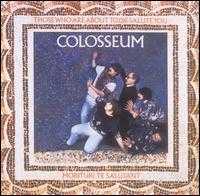Those Who Are About to Die Salute You
| Those Who Are About to Die Salute You | ||||
|---|---|---|---|---|
 | ||||
| Studio album by Colosseum | ||||
| Released | March 1969 | |||
| Recorded | Winter 1968/69 | |||
| Genre | Rock, jazz | |||
| Length | 39:38 | |||
| Label |
Fontana (UK) Dunhill (U.S.) | |||
| Producer | Tony Reeves, Gerry Bron | |||
| Colosseum chronology | ||||
| ||||
Those Who Are About to Die Salute You - Morituri Te Salutant is the debut album by Colosseum, released in 1969 by Fontana. It is one of the pioneering albums of jazz fusion.[1] The title is a translation of the Latin phrase morituri te salutant that according to popular belief (but not academic agreement), gladiators addressed to the emperor before the beginning of a gladiatorial match.
The album reached number 15 in the UK Albums Chart.[2]
Background
"Debut" is the very first song Colosseum ever played as a group.[3] Tony Reeves later recalled that "["Debut"] was actually a phrase that I remembered Mick Taylor playing with John Mayall, and I changed it a bit into a bass line. [Sings the part.] And then the band all joined in - this is what happens during rehearsals - so technically you should have everybody's name in the writing credit, including, I guess, Mick Taylor's!" [4]
"Mandarin" started from a series of sketches by Dave Greenslade based on a Japanese soft scale. Tony Reeves compiled the sketches into the main theme and arranged the song.[3]
"Beware the Ides of March" borrows theme of "A Whiter Shade of Pale" by Procol Harum[5] and theme of the fugue of "Toccata and Fugue in D minor" by Johann Sebastian Bach,[6] earlier borrowing already from theme of the air of "Orchestral Suite No. 3 in D major" by Bach.[7]
Band also recorded "I Can't Live Without You" by Litherland, which was released on 2004 re-release as a bonus track.
Reception
| Professional ratings | |
|---|---|
| Review scores | |
| Source | Rating |
| Allmusic | |
Allmusic's review was laudatory, saying the album "is a powerful one, unleashing each member's instrumental prowess at one point while consolidating each talent to form an explosive outpouring of progressive jazz/rock the next." They highly praised the variety and uniqueness of each song, the playing of the musicians, and the group's ability to create a blend of jazz, rock, and classical elements that was unconventional yet accessible. They concluded "the album never strays from its intensity or its creativity", and added that Valentyne Suite is similar and just as outstanding, even though Allmusic's official review of that album is largely negative.[8]
UK Track listing
- "Walking in the Park" (Bond) – 3:51
- "Plenty Hard Luck" (Greenslade/Heckstall-Smith/Hiseman/Litherland/Reeves) – 4:23
- "Mandarin" (Reeves/Greenslade) – 4:27
- "Debut" (Greenslade/Heckstall-Smith/Hiseman/Reeves) – 6:20
- "Beware the Ides of March" (Greenslade/Heckstall-Smith/Hiseman/Reeves) – 5:34
- "The Road She Walked Before" (Heckstall-Smith) – 2:39
- "Backwater Blues" (Leadbelly) – 7:35
- "Those About to Die" (Greenslade/Heckstall-Smith/Hiseman/Reeves) – 4:49
US Track listing
In the United States, it was released in July 1969 on the Dunhill label with a different track list and a different cover.[9]
- "The Kettle" - 4:15
- "Plenty Hard Luck" - 4:20
- "Debut" - 6:13
- "Those Who Are About to Die, Salute You - 4:47
- "Valentyne Suite" - 15:18
- "Valentyne Suite Theme One: January's Search" (Greenslade/Hiseman)
- "Valentyne Suite Theme Two: February's Valentyne" (Greenslade/Hiseman)
- "Valentyne Suite Theme Three: Beware the Ides Of March" (Heckstall-Smith/Hiseman)
- "Walking in the Park" - 3:49
Personnel
- Dave Greenslade - organ, vibraphone, piano, backing vocal on "The Road She Walked Before"
- Dick Heckstall-Smith - saxophones
- Jon Hiseman - drums
- James Litherland - guitar (except on "Backwater "Blues"), lead vocals
- Tony Reeves - bass guitar
- Jim Roche - guitar on "Backwater Blues"[3]
- Additional personnel
- Henry Lowther - trumpet on "Walking in the Park"[3]
References
- ↑ Joynson, Vernon (1995). The Tapestry of Delights. London: Borderline Books.
- ↑ Colosseum chart history, The Official Charts. Retrieved July 29, 2011.
- ↑ 3.0 3.1 3.2 3.3 Hiseman, Jon (1969). In Those Who Are About to Die Salute You [liner notes].
- ↑ July 2003. Interview with Tony Reeves, Let it Rock.
- ↑ Deram DM 126
- ↑ Bach BWV 565
- ↑ BWV 1068
- ↑ 8.0 8.1 Those Who Are About to Die Salute You at AllMusic
- ↑ Those Who Are About to Die Salute You discographic information, Discogs. Retrieved July 29, 2011.
| ||||||||||||||||||||||